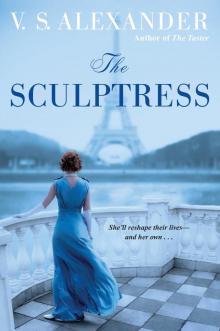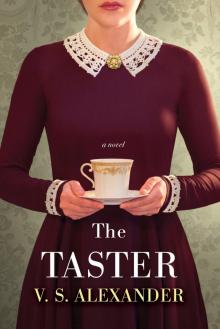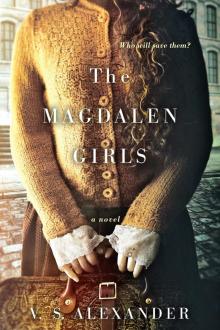- Home
- V. S. Alexander
Her Hidden Life Page 7
Her Hidden Life Read online
Page 7
‘Magda Ritter.’
She continued her conversation, asking me where I was born, questioning me about my parents, my schooling and how I came to work at the Berghof.
I answered everything truthfully. She shook my hand, but didn’t give her name. Obviously, I was expected to know who she was.
She studied me with her blue eyes. ‘I’ve seen you in the kitchen. What do you do?’
‘I’m a taster for the Führer.’
She beamed like a benevolent member of the clergy. ‘Ah, a wonderful position. You are protecting the life of the most important man in the world. You don’t know how he depends on his staff to guide him through these terrible times.’
I smiled because she knew so little of me and tasting. No matter how magnificent the meal, you wondered if it was your last. ‘I would never expect the Führer to know who we are.’
‘Of course he does. People like you lift him above the fray. If there was any threat to the Berghof, he would be the first to throw himself at the enemy. He would protect his staff until all danger had vanished.’
I nodded, uncertain of what she was getting at, but clearly Eva wanted to paint him as a kind and congenial man. Cook had told me stories about his loving interactions with Blondi, his dog, his fond dealings with Speer’s children and Eva’s guests. His closest associates believed the Führer could do no wrong.
Eva knelt in front of me and patted the Scotties. They sat patiently at her feet during our conversation. ‘Why are you reading here?’
‘Because my roommate is in no mood for company.’
She turned her attention from the dogs and put her hand upon mine. ‘I know how you feel. The Führer often ignores me, sometimes for days at a time, because he is so busy. When he leaves for other parts of the Reich, I go to my little house in Munich. Life can be lonely and boring there, too.’
It was hard for me to feel sorry for her with the world at her feet while others suffered, but I sensed that even as wealth and power lay within her reach she wasn’t happy. Her dejected expression added to her sudden melancholy mood.
‘Well, I’ve said too much and I need to get ready for the reception this afternoon,’ she said. ‘You will be going? If so, I hope you enjoy the dress I provided.’
‘Yes,’ I said, ‘it was nice of you to do so.’ I studied her clothes. ‘You look beautiful now. Why would you change?’
She rose to her feet and the dogs jumped up as well. ‘It’s one of the few pleasures I have. Dresses, makeup and jewelry. When I look beautiful, he is happy.’
She walked away and I called out, ‘What about the secret you were going to tell me?’ I regretted my silly words as soon as they left my lips.
Eva turned, her skirt swirling around her. ‘But I’ve already told you. I’ll see you later.’ She took a few steps and faced me again. ‘Why don’t you read in the sunroom? No one’s there and you shouldn’t be disturbed. If anyone asks, tell them I gave you permission.’
I thanked her and watched as she disappeared down the hall with the dogs at her feet. The companion of the most powerful man in Europe was lonely – that was her ‘secret.’
I walked to the sunroom, which was pleasant for reading even though its namesake was hidden by the clouds. It was in the original part of the old house and was furnished with lounge armchairs, a table and four rather uncomfortable slat-back chairs. I sat in one of the plush armchairs and spent most of my time looking out the wide picture window rather than concentrating on my poetry. Even though Eva said I could be there, I felt out of place on this side of the Berghof, away from my quarters.
In mid-afternoon, I returned to my room. Ursula was gone. I put on my costume and looked in the small mirror attached to the wall. There was nothing glamorous about me; in fact, I felt like a clown in an outfit that would be ridiculed outside of a beer hall. But Eva had ordered it and I felt compelled to comply. My costume didn’t include an apron. Karl rang my room about three and said he was on his way to the Teahouse and would see me there about four. Hitler was notorious for missing appointments. We expected it might be five before he even showed up.
Several members of the kitchen staff joined me when it came time to leave. Our mood was light and jovial. We even stopped at the overlook, but the valley was obscured by clouds, so there was little to see.
Gradually, the Teahouse came into view out of the mist like something from a fairy tale. Nazi flags and bunting festooned its turret, and a banner above the door proclaimed: Thank You for Your Service.
Inside, candles lit the room and a cheery fire in the hearth chased the damp away. Most of the kitchen staff were gathered inside and sat around a few small tables. The massive one with the view of the mountains was reserved for Hitler and his guests. Bavarian crèmes, cookies and apple cake, the Führer’s favorite, were displayed on fine china. Orderlies stood ready to serve the treats to the crowd. Fine champagne sat in ice buckets at each table within easy reach of the guests.
Karl observed the crowd from the kitchen entrance. Ursula was nowhere to be seen. I wondered how we could all cram inside the Teahouse. If it became too crowded, I decided, I would join Karl in the kitchen.
Franz Faber, the young officer Ursula disappeared with the night we went for a walk to the SS barracks, joined Karl. They talked for a time until Karl saw me. He left Franz and, sporting a broad grin, whispered in my ear, ‘You look rather silly.’
I scowled and then laughed. ‘I agree. I’ll be upset if Eva and Hoffmann are not here with their cameras.’ I looked around the room. ‘Have you seen Ursula?’
‘She’s making tea.’
I glanced through the turret windows. There was no sign of Hitler, Eva or their guests. The rain had let up, so Karl and I walked outside and stood near the steps leading to the entrance, stealing a few moments together. Our quiet was interrupted by the sudden, frenzied barking of a dog. That was followed by shouts and a general commotion.
Karl sprinted up the steps.
I followed and peered inside the door, careful to stay out of the way. Karl, Franz and the Colonel stood near the kitchen entrance. Behind them, I saw the pale, stricken face of Ursula. She wore her costume and the apron she’d been working on. The Colonel clutched a furiously barking black shepherd. The crazed animal snapped and growled at Ursula.
Over the uproar, Franz shouted, ‘It isn’t possible.’
The Colonel brushed him aside, gave control of the dog to Karl and then pulled Ursula from the kitchen into the circular room. She held a silver teapot in her right hand.
The Colonel took the teapot from Ursula and ordered her to take a cup from one of the small tables. Her hands shook as she obeyed his order.
Franz rushed to her and said to the Colonel, ‘I’m sure this is a mistake. Fräulein Thalberg would never poison the Führer.’
‘Shut up,’ the Colonel commanded. ‘Get away from her.’
Karl stared at me. Horror spread across his face. My heart pounded as I leaned against the door frame. The Colonel, still carrying the tea, grabbed Ursula roughly by the arm and pulled her down the steps of the Teahouse. He ordered her to hold out the cup; then he poured the hot liquid into it. He sniffed the steam as it rose in milky wisps in the air.
‘Drink it,’ he said. His lips formed a vicious smile.
Franz stood frozen in the doorway. Karl, still restraining the barking dog, stared in disbelief.
Ursula looked blankly at the Colonel. She lifted the cup to her lips and drank it in one draught.
The Colonel took back the cup and waited.
Nothing happened for a few long minutes as Ursula focused her gaze upon the ground. Then, slowly, her body convulsed. Her eyes rolled back in her head and she collapsed on the path. Franz started to run to her, but Karl and a member of the kitchen staff held him back.
Down the path, conversation and laughter filled the air. Hitler, with a walking stick in hand, strolled ahead of his entourage. He was accompanied by Eva and the guests, no more than fifty meters f
rom the Teahouse. She carried her camera in her quest to get photographs of the Führer. She darted ahead of him at one point to snap pictures.
I watched in disbelief as Ursula, her skin and lips turning blue, lay unconscious on the ground. The Colonel did nothing. Cook had told me about the body coloration as one of the symptoms of cyanide poisoning. It led to an unconscious state and respiratory failure – a lack of oxygen. The convulsions, her gasps, continued until her mouth gaped open. With one final breath, her body shook and then her arms fell lifeless by her sides.
Karl ordered the staff to stay inside, although the whole event could be seen through the Teahouse windows.
Heinrich Hoffmann, Hitler’s gray-haired photographer, rushed up and snapped a few pictures of the body. Hitler stopped the procession and motioned for the Colonel to come to him. With the teapot and cup in hand, he approached the Führer. I couldn’t hear their conversation, but after a short time Hitler turned and said something to the group. Amid looks of astonishment, they retreated and disappeared into the mist.
The Colonel poured out the contents of the pot on the trail and addressed Karl. ‘You should have better command over your staff, Captain. Get a couple of men to take the body to the doctor’s office for an autopsy.’ He grabbed his dog’s leash. The animal wanted to sniff Ursula’s body. ‘You and Faber – in my quarters in an hour. In the meantime, make sure the Teahouse is cleaned up. No one should eat or drink anything. Keep only the items that are sealed.’ He handed Karl the teapot and the cup.
He raised his right arm in salute. ‘Heil Hitler.’
Karl and Franz came to attention and saluted as well. The Colonel turned toward the Berghof, pulling his dog with him. As soon as he was out of sight, Franz’s eyes brimmed with tears. Karl held his friend back while two SS men took the body away.
‘Go back to your room and remain there,’ he told me when I approached. ‘None of us is above suspicion.’
The thought shook me. I took one last look inside the Teahouse with its magical furnishings. I remembered the fairy tales my mother had read to me when I was a child. They were often brutal tales ending in destruction or death. I was coming to realize how much the Reich was like a fairy tale. Death was never far away.
CHAPTER 6
I returned to a ransacked room. Ursula’s things had been removed. Our small closet stood open … Books and papers from the shelves had been scattered about. Shivering, I cleared a place on my bed, sat down and cried.
I cried for myself as much as Ursula. Fear crept over me. Was there no one I could trust? What about Captain Weber? A thought jolted me. What had Karl and Ursula been talking about in the Teahouse when we visited it? Could he have known about the poison? It made no sense to me – how could Ursula have been so foolish? Was Karl an accomplice? My gloomy questions distressed me. Ursula had ended her life and put mine in danger. She was mad to think she could have ever succeeded – but I dared not think about the attempt!
Someone knocked on the door. I wiped my tears and composed myself. I had no time to answer before I heard the turn of the doorknob. The door swung open and Cook stepped into the room. She was in great distress: her face crimped in pain, her hands clenched. She lurched about in the small space between the beds, more agitated than I’d ever seen her.
‘Did you know anything of this?’ She slowed her steps and paced back and forth near the door like a caged tiger.
‘Of course not,’ I said, and looked away. I couldn’t imagine she expected me to answer ‘yes.’
‘Look at me! Never avert your eyes when the SS or the Gestapo question you.’ Her face reddened. ‘You might as well admit your guilt. If you give them any indication you’re lying, they will beat you until they have what they want to hear.’
I sobbed at her harsh words. ‘I don’t know how this happened. How could Ursula do such a thing?’
Cook sat next to me and her voice softened. ‘I believe you knew nothing of this, but you must prove your innocence. I know Ursula suffered because of her brothers’ deaths – but to attempt such an insane act! How could she be so callous? In an attempt to poison the Führer she has ended her life and dishonored her family. The Gestapo will question all of us.’ She wrung her hands. ‘What a stupid woman.’
I looked at her, not knowing what to say. I had proclaimed my innocence, yet I could tell no one about the powder I saw upon Ursula’s apron. To do so would implicate me.
‘Captain Weber has called for a new taster, but she won’t be here until tomorrow,’ Cook said. ‘Tonight you must taste all the food. Be in the kitchen by seven.’
She left and I changed out of my Bavarian costume into my work clothes. In a fury, I threw the Bavarian dress on the bed, disgusted by the event it represented. I wanted to tear it to bits and toss it into the hall as a reminder to Eva of her ridiculous idea.
Soon another knock, loud and firm, interrupted me. I opened the door and was shocked to see the Colonel. He pushed past me, sat on the desk chair and eyed me suspiciously. I took Cook’s advice and looked into his eyes as he questioned me.
At one point, he asked, ‘Have you stopped smuggling poison into the Berghof?’ I caught his trick. Either answer, negative or affirmative, would have incriminated me.
‘I never brought poison into the Berghof for her or anyone else. I had no idea Ursula was carrying out such a plan.’
He stared me down and asked where Ursula might have gotten it. I told him I didn’t know; it was absurd to ask me.
He seemed satisfied by my answers, but asked me more questions about my habits. He wanted to know who I knew at the Berghof, what I felt about the Reich.
My stomach turned when I answered questions about the Reich. For the first time in my life, I was lying to save myself. Only anger and pain about Ursula’s death, Hitler and the war filled me. The Colonel told me, from now on, to report any suspicious behaviors directly to him. The kitchen and staff would be under special watch. He said good-bye, stood and saluted the Führer. I had no choice but to do the same.
That night, in the kitchen, two SS guards watched the staff’s every move. I didn’t know them because my contact with the Leibstandarte had primarily been limited to Karl and Franz. One of the guards, a rat-like man with greasy blond hair, observed my tasting. My nerves were on edge. I wondered if Ursula had spread cyanide in the food as well as the tea. The kitchen door slammed and I dropped a spoonful of an asparagus dish destined for Hitler. The SS man was quick to act. He pointed menacingly and commanded me to take another bite. Cook glowered at him, but it did no good. Tensions were running high. I managed to make it through the tastings, but I trembled with every bite as dread shook me.
The next morning, Cook gave me a list of vegetables and asked me to record the number of those plants in the greenhouses. I gathered the inventory books and walked up the grassy slope to the glass and metal structures that glinted in the silvery morning haze. The air felt fresh and dewy against my skin; the sunlight had that magical, ethereal effect, painting the surrounding mountains in muted pastels. It was like walking in a watercolor.
The greenhouses were two tiered, both about 150 meters long. Most of the fresh food for Hitler was grown here. There was also a ‘mushroom house.’ Cook had told me that the Führer rarely ate them, but apparently others did in enough quantity to warrant a special growing area.
I opened the door to the lower greenhouse and stepped inside. Even though the morning was cool, the greenhouse was warm. I took off my jacket and draped it over a metal stand. A patchwork quilt of plants lay on the floor as far as I could see. I grabbed my book and pen and walked past the square plots until I got to a plant I recognized on my list – cucumbers. I bent down and began counting the staked plants festooned with their starry yellow flowers. The door opened behind me.
Karl stood at the entrance. He put his right hand over his eyes to shade them from the light and stared at me. I waved. He called my name and walked quickly toward me. We were the only two people in the greenhouse.
When he got to me, he stopped and looked the greenhouse over from top to bottom. He whispered in my ear, ‘Be careful what you say.’
‘I can only talk a few minutes,’ I said. ‘I have a job to do for Cook.’
I picked up my jacket and left the inventory books on the stand. We walked down the paved road in front of the greenhouses. Karl breathed easier when we got to a safe spot. Below us, the Berghof glowed in the sun.
‘How did it go with the Colonel?’ Karl asked.
I looked at him, trying to gauge the intent of his question, wondering whether I should trust him. There was something about him – a kindness, a willingness to listen – that made me want to trust him, to feel comfortable enough to talk honestly. ‘I answered his questions,’ I said, trying to be non-committal.
He reached into his pocket and pulled out a gold cigarette lighter. He fidgeted with it and turned it over in his palm a few times. ‘I’m still trying to give them up.’ He pointed to the lighter. ‘At least it gives me something to do.’ He chuckled and then asked, ‘Did you notice anything unusual about Ursula before you went to the Teahouse?’
I shook my head.
Karl’s face tensed and his gaze narrowed. He put his arm around my shoulder; his face was close to mine. ‘I told the Colonel you knew nothing about the incident yesterday, despite what you may have seen.’
My heart raced.
‘I protected you in every way I could,’ he continued.
‘Why?’
‘Because – ’ He drew away and looked at the lighter in his hand. ‘This is hard for me to admit, but since you’ve come to the Berghof, I’ve been unable to think of much else besides you.’ He turned away, as if he was afraid of what I might tell him.
I put my hand on his shoulder. ‘I’ve thought about you as well.’
He turned, his face flushed. ‘Really? I’m very happy to hear that.’
I laughed. ‘You don’t have to be so formal, Karl. This is as new for me as I suspect it is for you.’ I pulled him to me and gave him a kiss on the cheek.

 The Irishman's Daughter
The Irishman's Daughter The Sculptress
The Sculptress The Taster
The Taster Her Hidden Life
Her Hidden Life The Magdalen Girls
The Magdalen Girls